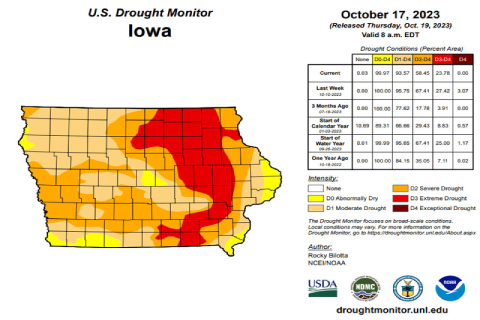By Dar Danielson (Radio Iowa)
There’s still hope that the remainder of the fall will bring heavier moisture than normal that can help cut back the ongoing drought in Iowa. DNR hydrologist Tim Hall says recent rains weren’t enough to make a big dent, but did erase the areas of D-4 or extreme drought.
“Areas of Benton and Tama County that were previously in the D-4classification saw enough rain to improve to D-3. But improvement to D-3 is still D-3,” he says. The D-3 designation is extreme drought compared to the D-4 exceptional drought designation. There is only a small sliver of the state that has no drought.
Hall says late fall has not been the best time to make up a moisture deficit, though there have been exceptions. “By the time we get to November, we see less than two inches of rain over the entire month. However, a couple years ago, we saw a very wet October, we’ve seen very wet fall months before,” Hall says. “So there’s certainly the opportunity to see noticeable and really helpful rainfall.”
He says warmer temperatures would help, as they keep the ground from freezing and shutting out water. “The first thing that happens when it rains is you get water into the soil matrix and you improve soil moisture. And after that, the water can move down into shallow groundwater. That all sort of comes to an end with the ground freeze up. You tend to get very rapid runoff in ground freeze up and not as much benefit,” Hall says.
The short -erm forecast has the potential for some rains in the coming week. “There could be widespread rain in the one to two inch rain across a lot of the state. So there’s there’s some optimism that between now and the end of the month we could see another inch plus of rain which would certainly be great,” he says. ” I mean at now, anything we get over about three quarters of an inch in a week is above normal. So we’d love to see that.”
Hall says any rain we get before the ground freezes is a bonus in helping build up of the groundwater that has been way behind for months.




